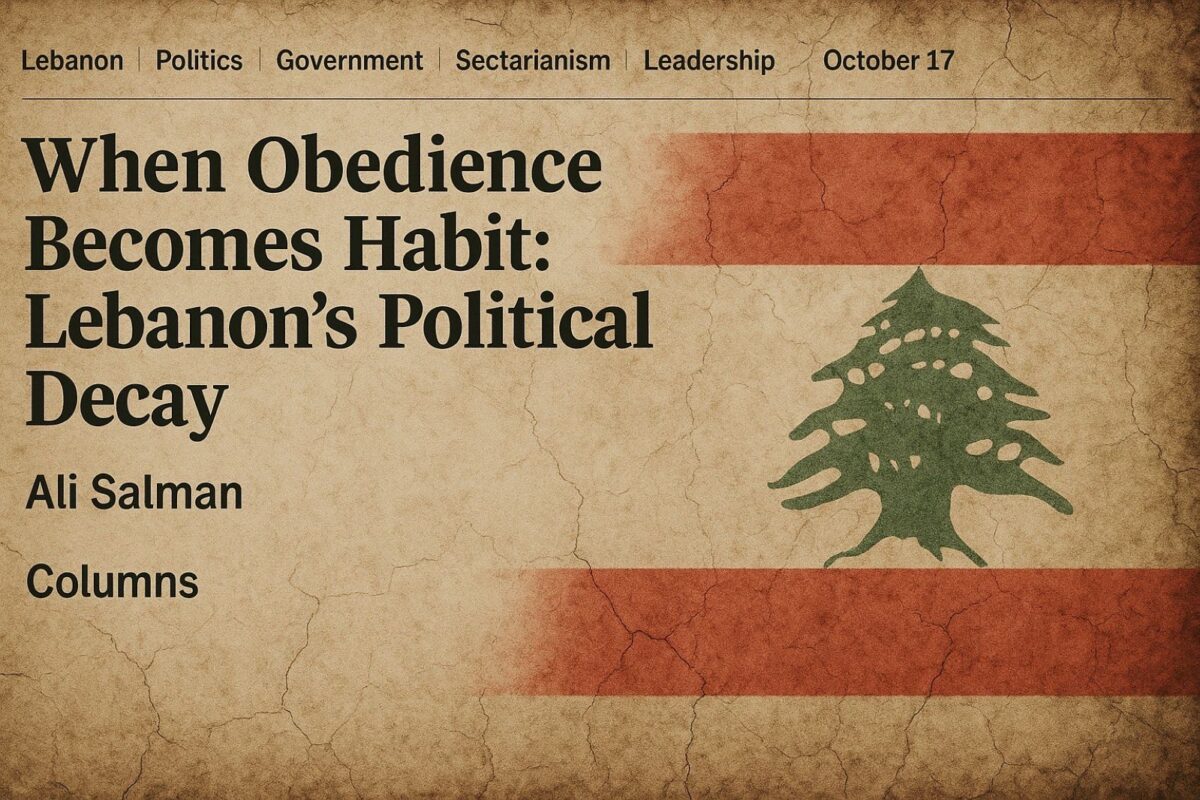
Lebanon’s sectarian system still puts on its old show. You hear speeches about protection, sermons about identity, and threats about chaos on TV. But it’s all performance now. The words don’t convince anyone anymore, and the people saying them don’t inspire anything. People obey because they don’t see another option, not because they believe. In a country where survival has replaced loyalty, legitimacy is already gone. The corpse just hasn’t been buried yet.
For years, sectarianism wasn’t seen as corruption. It was a system that kept the country balanced after the war. No group could fully dominate, and every side got both privilege and fear in equal measure. Each sect had its own protector and its own enemy, and every citizen had a reason to stay loyal. It worked because it offered what the state couldn’t: a kind of order built on fear and dependency.
But no system survives once people stop believing in it. When the economy collapsed and the state stopped giving people any sense of dignity, sectarianism lost its use. The old stories about protection don’t match reality anymore. Leaders who once ruled through trust now rule through exhaustion. Their followers stay, but only because they are too tired to fight. That is how political decay looks, when obedience becomes automatic.
The October 17 uprising was the first real crack. For the first time in decades, people acted not as sects but as one exhausted class. They didn’t want new leaders. They wanted the end of the illusion. The regime survived, but it came back weaker and stripped of confidence. What returned was a political class that is scared, because deep down, it knows its followers don’t believe anymore.
Today, every sectarian leader controls a shrinking circle of clients, not believers. The sacred bond between leader and people is gone and has been replaced by transactions. Jobs, medicine, and favors are exchanged for silence. That is not legitimacy; that is blackmail dressed up as politics. Power that depends only on need can last for a while, but it cannot endure. Fear can keep a ruler in power for a season, but only belief keeps him there for generations.
The people know this too. Even those who still vote for their sectarian party don’t pretend it’s out of conviction. They talk about their leaders the way they talk about generators: corrupt, unreliable, but still necessary. The younger generation doesn’t see protection in sectarianism anymore; they see humiliation. Their rejection might be quiet, but it’s irreversible. They will inherit the system without inheriting its fears, and that means they will also inherit the will to bring it down.
You can see this clearly in Barouk. For decades, it was considered a stronghold of the Progressive Socialist Party, loyal to the Joumblatt family. But in the last municipal election, even with Walid Joumblatt personally backing one PSP candidate, that candidate lost. It wasn’t just a political defeat. It was a symbolic break. The idea that a leader’s endorsement was enough to guarantee victory simply died.
The lesson isn’t just about Barouk. It’s about power that mistakes habit for loyalty. Joumblatt, one of Lebanon’s most adaptable politicians, always understood that authority isn’t inherited; it must be earned repeatedly. But even adaptability has limits. The people of Barouk didn’t rebel. They just quietly refused to obey. And that is how legitimacy really dies, not with riots, but with silence.
The simple truth is this: a ruler can keep his title but lose his power the moment people stop fearing or admiring him. When obedience becomes a choice, authority turns into ceremony. What happened in Barouk wasn’t betrayal; it was indifference. And indifference is the coldest kind of political death. Power doesn’t die when it’s attacked; it dies when it stops mattering.
Still, the fall of sectarian legitimacy doesn’t mean reform is coming. It means mutation. Power in Lebanon never disappears; it just changes shape. As the old leaders lose their aura, new players rise: NGOs, local bosses, militias, and foreign-backed actors. The game stays the same: loyalty traded for survival. We are heading into a post-sectarian clientelist era, where people won’t defend faith, they’ll sell obedience to whoever can provide what the state cannot.
It might feel like freedom at first, but it’s not. It’s just another kind of dependence. Sectarianism will fade as an idea but stay alive as a habit. It will survive in how people talk, how they live, and how they make daily choices. The new politics will be transactional, not ideological, a competition between those who can deliver, not those who can inspire. Lebanon will trade the illusion of sacred authority for the reality of raw control.
What comes next is a vacuum of belief. When no one rules by conviction, power belongs to those who know how to exploit exhaustion. The next chapter won’t be written by reformers or dreamers, but by opportunists who understand that a tired people are easier to rule than an angry one. That is when power goes back to its most basic form, the ability to act without permission.
Lebanon’s sectarian order once gave balance. Now it gives paralysis. It cannot fix itself because its survival depends on the same decay it denies. Its leaders know that chaos keeps them useful, and usefulness keeps them safe. But every system that feeds on exhaustion eventually runs out of energy. When obedience no longer guarantees survival, habit breaks. The next political order in Lebanon will rise not from belief or ideology, but from whoever first understands that legitimacy is already gone and acts on it.
Ali Salman, a political science graduate and researcher at the Grand Serail. His work explores the mechanisms of power and the pragmatic strategies required to rebuild fragile states and strengthen political systems.
The views in this story reflect those of the author alone and do not necessarily reflect the beliefs of NOW







